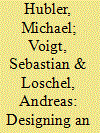| Srl | Item |
| 1 |
ID:
116717


|
|
|
|
|
| Publication |
2012.
|
| Summary/Abstract |
(1) We estimate CO2 implicitly exported via commodities relative to a region's total emissions: We find -15% for the industrialized, 12% for the developing region, and 24% for China. (2) We analyze a Contraction and Convergence climate regime in a CGE model including international capital mobility and technology diffusion: When China does not participate in the regime and instead a carbon tariff is imposed on its exports, it will likely be worse off than when participating. This result does not hold for the developing region in general. Meanwhile, the effect on emissions appears small.
|
|
|
|
|
|
|
|
|
|
|
|
|
|
|
|
| 2 |
ID:
136193


|
|
|
|
|
| Summary/Abstract |
We assess recent Chinese climate policy proposals in a multi-region, multi-sector computable general equilibrium model with a Chinese carbon emissions trading scheme (ETS). When the emissions intensity per GDP in 2020 is required to be 45% lower than in 2005, the model simulations indicate that the climate policy induced welfare loss in 2020, measured as the level of GDP and welfare in 2020 under climate policy relative to their level under business-as-usual (BAU) in the same year, is about 1%. The Chinese welfare loss in 2020 slightly increases in the Chinese rate of economic growth in 2020. When keeping the emissions target fixed at the 2020 level after 2020 in absolute terms, the welfare loss will reach about 2% in 2030. If China׳s annual economic growth rate is 0.5 percentage points higher (lower), the climate policy-induced welfare loss in 2030 will rise (decline) by about 0.5 percentage points. Full auctioning of carbon allowances results in very similar macroeconomic effects as free allocation, but full auctioning leads to higher reductions in output than free allocation for ETS sectors. Linking the Chinese to the European ETS and restricting the transfer volume to one third of the EU׳s reduction effort creates at best a small benefit for China, yet with smaller sectoral output reductions than auctioning. These results highlight the importance of designing the Chinese ETS wisely.
|
|
|
|
|
|
|
|
|
|
|
|
|
|
|
|
| 3 |
ID:
119796


|
|
|
|
|
| Publication |
2013.
|
| Summary/Abstract |
We carry out a detailed computable general equilibrium (CGE) analysis of the EU Decarbonisation Roadmap 2050 on a macroeconomic and on a sectoral level. Herein, we study a Reference scenario that implements existing EU policies as well as 3 unilateral and 3 global climate action scenarios. We identify global climate action with international emissions trading and the full equalisation of CO2 prices across all (EU) sectors as an economically reasonable policy option to avoid additional costs of the Decarbonisation Roadmap to a large extent. This policy option may include CDM (Clean Development Mechanism in the sense of 'where'-flexibility) in an extended form if there are countries without emissions caps. Moreover, we identify diverse sectoral effects in terms of output, investment, emissions and international competitiveness. We conclude that the successful realisation of the EU Decarbonisation Roadmap probably requires a wise and joint consideration of technology, policy design and sectoral aspects.
|
|
|
|
|
|
|
|
|
|
|
|
|
|
|
|